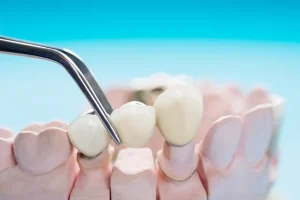Most people are unaware of the various specialities in dentistry that address specific concerns and often visit general dentists for all their dental needs. However, specialists undergo additional extensive training beyond the general dental course. Therefore, they focus on a particular area of dentistry and provide treatments exclusive to their speciality.
Periodontology is a sub-section of dentistry that focuses on an individual’s gum and periodontal health. While both dentists and periodontists prioritize oral health, they have different areas of expertise and distinct roles. The differences between a periodontist vs dentist include their responsibilities, training, and the types of treatments they provide.
Table of Contents
Important Differences between a Dentist vs Periodontist
The following are the key differences between a periodontist vs dentist:
General Dentist
A general dentist is an oral healthcare provider who offers a range of dental treatments, including primary procedures. They address common dental concerns that do not require extensive intervention. General dentists are versatile in treating patients of all age groups. They undergo four years of training to become licensed dental practitioners. The most commonly performed procedures in a general dentist’s office include:
- Diagnosis and Treatment: They can use X-rays to diagnose many dental issues and treat dental concerns that do not require specialized care.
- Focus on Preventive Care: General dentists prioritize preventive care in kids to avoid decay. Preventive care helps build a strong foundation for permanent dentition.
- Routine Procedures: General dentists are train to perform routine procedures, including cleanings, fillings, root canals, tooth replacement, and minor extractions.
- Basic Cosmetic Dentistry: The general dentist can also help with minor cosmetic dental procedures. Which include dental bonding, crowns and bridges, and teeth whitening.
Periodontist
Periodontists receive additional training to specialize in treating supporting oral structures of the teeth. Including the bone, periodontal ligament, and gums. This advanced training involves a three-year residency program, where periodontists gain expertise in periodontal surgical procedures, dental implant placements, and comprehensive periodontal care.
Procedures that fall under the expertise of periodontists include:
- Deep Cleanings and Root Planing: Aggressive forms of periodontal disease cannot be treat with basic cleanings. They require deep cleaning and curettage to remove debris from the root area, which is not visible above the gums. In cases of severe gum disease with pocket formations, periodontists perform pocket reduction surgeries.
- Grafting Procedures: These procedures are surgical and are performed when a significant amount of gingiva or bone has been lost. Periodontists may use gum grafts to cover exposed roots. Bone grafting is typically recommend for areas with bone deficiency, either to support dental implants or to address bone loss caused by infection.
- Dental Implants: Dental implant procedures are a key area of expertise for periodontists. They are highly trained in the placement and management of implants. After thoroughly examining the periodontal and surrounding structures, a periodontist may place bone or gum grafts to enhance the success of the treatment.
- Laser Surgery: These are laser-assisted procedures that cause minimal trauma to the tissues. Lasers are use for reshaping the gums or performing periodontal surgery.
- Cosmetic Enhancements: Periodontal procedures can also enhance an individual’s aesthetic appearance. These cosmetic treatments include crown lengthening, which is used to correct gummy smiles.
When to Visit a Periodontist vs Dentist?
Dentists and periodontists both prioritize oral health and a disease-free oral cavity. Although each offers distinct treatments for different dental problems, it is important to learn about the dental diseases treated by a dentist or periodontist.
When to Visit a Dentist?
A general dentist provides comprehensive treatment to almost all age groups, from children to seniors. They can address issues including toothache, tooth fracture, minor extractions, removal of plaque and calculus buildup, and filling of decayed tooth structure. They are also equipped with knowledge about denture fabrication and tooth replacement, including bridges and crown placement in elderly patients.
When to Visit a Periodontist?
Although cleanings are also done at the dentist’s office, deep cleanings and root planing are administered effectively by a periodontist. Bacterial accumulation in the periodontal ligament aids in the formation of periodontal pockets, which further leads to bone recession.
- Periodontal Disease: If you experience swollen gums, frequent bleeding, and bad breath that persists even after dental cleaning, it may be time to visit a periodontist. These symptoms could indicate the presence of periodontal disease, requiring expert care. Periodontists diagnose the condition and develop treatment plans to treat the core issue and eliminate the factors contributing to the disease.
- Aesthetic Enhancement: A gummy smile is often consider less aesthetically pleasing, and many people feel self-conscious about the excessive gingival exposure. Periodontists address this by extracting a portion of the gum’s tissue to expose more of the teeth beneath, a procedure known as crown lengthening, which helps to correct a gummy smile.
- Dental Implants: People dealing with the challenges of missing teeth often turn to tooth replacement options, with dental implants being the most successful and reliable choice. Periodontists, with their extensive knowledge of the procedure, can efficiently replace missing teeth using dental implants.
Conclusion
It is important to understand when to consult a periodontist vs dentist to access appropriate treatment for your oral issues. While general dentists provide initial care and address common dental issues, severe cases, such as advanced gum disease or tooth loss, often require the expertise of a periodontist. However, general dentists can collaborate with periodontists, ensuring comprehensive treatment, or make referrals when specialized care is necessary for the patient’s best outcome.
If you’re suffering from a specific dental ailment, you can consult the specialists at Anoka Dental. With years of experience, we can accurately diagnose and treat oral health issues to foster overall and long-lasting wellness. Visit our website or contact us today!




